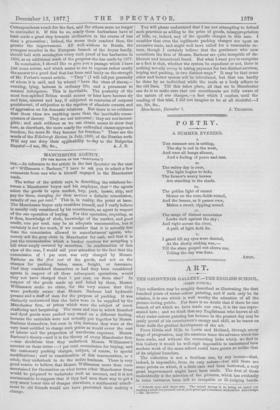MANCHESTER AGENCY. (To THB EDIT= OF TIIN encaTAT0R, , 1 Stn,—In reference
to the article in the last Spectator on the case of " Williamson v. Barbour," I have to ask you to admit a few comments from one who is himself engaged in the Manchester trade.
The writer of the article says, in describing the relations be- tween a Manchester buyer and his employer, that " the agents select the goods in open market, buy, pack, insure, ship, and pay for them, charging for these services a definite commission,
usually of one per cent." This is, in reality, the point at issue.
The Manchester buyer only considers himself, and I verily believe is usually only considered by his constituents, an agent in respect
of the one operation of buying. For this operation, requiring, as it does, knowledge of cloth, knowledge of the market, and good credit, one per cent. may be an adequate remuneration, but it Certainly is not too much, if we consider that it is actually less than the commission allowed to manufacturers' agents, who merely sell the grey cloth in Manchester for cash, and that it is just the remuneration which a banker receives for accepting a bill when amply covered by securities. In confirmation of this
view of the case, I would call your attention to the fact that the commission of 1 per cent, was only charged by Messrs. Barbour on the first cost of the goods, and not on the .charges for packing, bales, cases, freight, or insurance. Had they considered themselves or had they boon considered agents in respect of all these subsequent operations, would they not have charged their 1 per cent. on them also? In respect of the goods mado up and baled by them, Messrs. Williamson make no claim, for the very reason that they were perfectly aware that Messrs. Barbour had hydraulic presses and a staff of men for the purpose of packing. It was
distinctly understood that the bales were to be supplied by the Manchester firm, at prices which were the subject of much chaffering and bargaining. The cases and tins in which bleached and dyed goods were packed may stand on a different footing,
because the materials wore not actually put together by Messrs. Barbour themselves, but even in this instance they were at the
very least entitled to charge such prices as would cover the cost of labour and the proportion of warehouse expenses. Messrs. Barbour's theory—and it is the theory of every Manchester firm
—was doubtless that they undertook Messrs. Williamson's account on these terms :-1 per cent. commission for buying, and the customary packing charges, subject, of course, to special modifications ; and in consideration of this remuneration, as a Whole, they undertook to do the entire buainess. There is very good reason to believe that Messrs. Williamson more than once ascertained for themselves on what terms other Manchester firms
would be prepared to undertake such an account, and it is not unreasonable to suppose that if they had seen their way to get a very much lower rate of charges elsewhere, a sentimental attach- ment to old friends would not have prevented their making a change.
You will please understand that I am not attempting to defend such practices as adding to the price of goods, misappropriation of bills, or, indeed, any of the specific charges in this case. I consider that even the legitimate packing charges are upon an excessive scale, and might well have called for a reasonable re- turn, though I certainly believe that the gentlemen who now constitute the firm of Messrs. Barbour are quite incapable of de- liberate and intentional fraud. But what I want you to recognise as a fact is that, whether the system be expedient or not, there is nothing morally wrong in taking payment for two distinct services, buying and packing, in two distinct ways.* It may be that some other and better system will bo introduced, but that can hardly be done by an individual while the trade as a body adhere to the old lines. Till this takes place, all that we in Manchester can do is to make sure that our constituents are fully aware of time nature of our charges,—a fact which I confess, until the reading of this trial, I did not imagine to be at all doubtful.—I am, Sir, &c.,










































 Previous page
Previous page